- Home
- Elizabeth Gilbert
City of Girls Page 2
City of Girls Read online
Page 2
This scene would have been even more awkward than it sounds, except that eventually I got distracted by my own reflection in the train window, and that kept me busy for a good long while. (Forgive me, Angela, but being captivated by your own appearance is part of what it means to be a young and pretty girl.) It turns out that even this handsome stranger was not nearly as interesting to me as the shape of my own eyebrows. It’s not only that I was interested in how well I’d groomed them—though I was absolutely riveted by that subject—but it just so happens that I was trying that summer to learn how to raise one eyebrow at a time, like Vivien Leigh in Gone with the Wind. Practicing this effect took focus, as I’m sure you can imagine. So you can see how the time just flew by, as I lost track of myself in my reflection.
The next time I looked up, we had pulled into Grand Central Station already, and my new life was about to begin, and the handsome man was long gone.
But not to worry, Angela—there would be plenty more handsome men to come.
Oh! I should also tell you—in case you were wondering whatever became of her—that my Grandmother Morris had died about a year before that train deposited me into New York City. She’d passed away in August of 1939, just a few weeks before I was meant to start school at Vassar. Her death had not been a surprise—she’d been in decline for years—but still, the loss of her (my best friend, my mentor, my confidante) devastated me to the core.
Do you know what, Angela? That devastation might’ve had something to do with why I performed so poorly at college my freshman year. Perhaps I had not been such a terrible student, after all. Perhaps I had merely been sad.
I am only realizing this possibility at this moment, as I write to you.
Oh, dear.
Sometimes it takes a very long while to figure things out.
TWO
Anyway, I arrived in New York City safely—a girl so freshly hatched that there was practically yolk in my hair.
Aunt Peg was supposed to meet me at Grand Central. My parents had informed me of this fact as I’d gotten on the train in Utica that morning, but nobody had mentioned any particular plan. I’d not been told exactly where I was supposed to wait for her. Also, I’d been given no phone number to call in case of an emergency, and no address to go to should I find myself alone. I was just supposed to “meet Aunt Peg at Grand Central,” and that was that.
Well, Grand Central Station was grand, just as advertised, but it was also a great place for not finding someone, so it’s no surprise that I couldn’t locate Aunt Peg when I arrived. I stood there on the platform for the longest time with my piles of luggage, watching the station teeming with souls, but nobody resembled Peg.
It’s not that I didn’t know what Peg looked like. I’d met my aunt a few times before then, even though she and my father weren’t close. (This may be an understatement. My father didn’t approve of his sister Peg any more than he’d approved of their mother. Whenever Peg’s name came up at the dinner table, my father would snort through his nose and say, “Must be nice—gallivanting about the world, living in the land of make-believe, and spending it by the hundreds!” And I would think: That does sound nice. . . .)
Peg had come to a few family Christmases when I was young—but not many, because she was always on the road with her theatrical touring company. My strongest memory of Peg was from when I’d come to New York City for a day trip at age eleven, accompanying my father on a business venture. Peg had taken me to skate in Central Park. She’d brought me to visit Santa Claus. (Although we both agreed I was far too old for Santa Claus, I would not have missed it for the world, and was secretly thrilled to meet him.) She and I had also eaten a smorgasbord lunch together. It was one of the more delightful days of my life. My father and I hadn’t stayed overnight in the city because Dad hated and distrusted New York, but it had been one glorious day, I can assure you. I thought my aunt was terrific. She had paid attention to me as a person, not a child, and that means everything to an eleven-year-old child who does not want to be seen as a child.
More recently, Aunt Peg had come back home to my hometown of Clinton in order to attend the funeral of Grandmother Morris, her mother. She’d sat next to me during the service and held my hand in her big, capable paw. This gesture had both comforted and surprised me (my family were not predisposed toward hand-holding, you may be shocked to learn). After the funeral, Peg had embraced me with the strength of a lumberman, and I’d dissolved into her arms, spewing out a Niagara of tears. She’d smelled of lavender soap, cigarettes, and gin. I’d clung to her like a tragic little koala. But I hadn’t been able to spend much time with her after the funeral. She needed to leave town right away, because she had a show to produce back in the city. I felt that I’d embarrassed myself by falling to bits in her arms, comforting though she had been.
I barely knew her, after all.
In fact, what follows is the sum total of everything I knew about my Aunt Peg, upon my arrival in New York City at the age of nineteen:
I knew that Peg owned a theater called the Lily Playhouse, located somewhere in midtown Manhattan.
I knew that she had not set out for a career in the theater, but had come by her work in a rather random way.
I knew that Peg had trained as a Red Cross nurse, curiously enough, and had been stationed in France during World War I.
I knew that, somewhere along the way, Peg had discovered that she was more talented at organizing entertainments for the injured soldiers than she was at tending to their wounds. She had a knack, she found, for turning out shows in field hospitals and barracks that were cheap, quick, gaudy, and comic. War is a dreadful business, but it teaches everyone something; this particular war taught my Aunt Peg how to put on a show.
I knew that Peg had stayed in London for a good long while after the war, working in the theater there. She was producing a revue in the West End when she met her future husband, Billy Buell—a handsome and dashing American military officer who had also decided to stay in London after the war to pursue a career in the theater. Like Peg, Billy came from “people.” Grandmother Morris used to describe the Buell family as “sickeningly wealthy.” (For years, I wondered what that term meant, exactly. My grandmother revered wealth; how much more of it would qualify as “sickening”? One day I finally asked her this question, and she answered, as if it explained everything: “They’re Newport, darling.”) But Billy Buell, Newport though he may have been, was similar to Peg in that he shunned the cultured class into which he had been born. He preferred the grit and glitter of the theater world to the polish and repression of café society. Also, he was a playboy. He liked to “make fun,” Grandmother Morris said, which was her polite code for “drinking, spending money, and chasing women.”
Upon their marriage, Billy and Peg Buell returned to America. Together, they created a theatrical touring company. They spent the better part of the 1920s on the road with a small cadre of troupers, barnstorming towns all across the country. Billy wrote and starred in the revues; Peg produced and directed them. The couple never had any highfalutin ambitions. They were just having a good time and avoiding more typical adult responsibilities. But despite all the effort they made not to be successful, success accidentally hunted them down and captured them anyhow.
In 1930—with the Depression deepening and the nation tremulous and afraid—my aunt and her husband accidentally created a hit. Billy wrote a play called Her Jolly Affair, which was so joyful and fun that people just ate it up. Her Jolly Affair was a musical farce about an aristocratic British heiress who falls in love with an American playboy (portrayed by Billy Buell, naturally). It was a light bit of fluff, like everything else they’d ever plunked down on the boards, but it was a riotous success. All across America, pleasure-starved mine workers and farmers shook out the last bits of loose change from their pockets in order to see Her Jolly Affair, making this simple, brainless play into a profitable triumph. The play picked up so much steam, in fact, and garnered such bountiful praise in
the local papers, that in 1931, Billy and Peg brought it to New York City, where it ran for a year in a prominent Broadway theater.
In 1932, MGM made a movie version of Her Jolly Affair—which Billy wrote but did not star in. (William Powell did the acting job instead. Billy had decided by this point that a writer’s life was easier than an actor’s life. Writers get to set their own hours, they aren’t at the mercy of an audience, and there’s no director telling them what to do.) The success of Her Jolly Affair spawned a series of lucrative motion picture sequels (Her Jolly Divorce, Her Jolly Baby, Her Jolly Safari), which Hollywood churned out for a few years like sausages from a hopper. The whole Jolly enterprise made quite a pile of money for Billy and Peg, but it also signaled the end of their marriage. Having fallen in love with Hollywood, Billy never came back. As for Peg, she decided to close the touring company and use her half of the Jolly royalties to buy herself a big, old, run-down New York City theater of her very own: the Lily Playhouse.
All this happened around 1935.
Billy and Peg never officially divorced. And while there didn’t seem to be any bad blood between them, after 1935 you couldn’t exactly call them “married,” either. They didn’t share a home or a work life, and at Peg’s insistence, they no longer shared a financial life—which meant that all that shimmering Newport money was now out of reach for my aunt. (Grandmother Morris didn’t know why Peg was willing to walk away from Billy’s fortune, other than to say about her daughter, with open disappointment, “Peg never cared about money, I’m afraid.”) My grandmother speculated that Peg and Billy never legally divorced because they were “too bohemian” to concern themselves with such matters. Or maybe they still loved each other. Except theirs was the sort of love that best thrives when a husband and wife are separated by the distance of an entire continent. (“Don’t laugh,” my grandmother said. “A lot of marriages would work better that way.”)
All I know is that Uncle Billy was out of the picture for the entirety of my young life—at first because he was touring, and later because he had settled in California. He was so much out of the picture, in fact, that I’d never even met him. To me, Billy Buell was a myth, composed of stories and photos. And what glamorous stories and photos they were! Grandmother Morris and I frequently saw Billy’s picture in the Hollywood tabloid magazines, or read about him in Walter Winchell’s and Louella Parsons’s gossip columns. We were ecstatic, for instance, when we found out he’d been a guest at Jeanette MacDonald and Gene Raymond’s wedding! There was a picture of him at the wedding reception right there in Variety, standing just behind luminous Jeanette MacDonald in her blush-pink wedding gown. In the photo, Billy was talking to Ginger Rogers and her then husband, Lew Ayres. My grandmother had pointed out Billy to me and said, “There he is, conquesting his way across the country, as usual. And look at the way Ginger is grinning at him! If I were Lew Ayres, I’d keep an eye on that wife of mine.”
I’d peered closely at the photo, using my grandmother’s jeweled magnifying lens. I’d seen a handsome blond man in a tuxedo jacket, whose hand was resting on Ginger Rogers’s forearm, while she, indeed, sparkled up at him with delight. He looked more like a movie star than the actual movie stars who were flanking him.
It was amazing to me that this person was married to my Aunt Peg.
Peg was wonderful, to be sure, but she was so homely.
What on earth had he ever seen in her?
I couldn’t find Peg anywhere.
Enough time had passed that I now officially gave up the hope of being met on the train platform. I stashed away my baggage with a Red Cap and wandered through the rushing crush of humanity that was Grand Central, trying to find my aunt amid the confluence. You might think I would’ve been more disquieted at finding myself all alone in New York City with no plan and no chaperone, but for some reason I wasn’t. I was sure it would all end up all right. (Maybe this is a hallmark of privilege: certain well-bred young ladies simply cannot conceive of the possibility that somebody will not be along shortly to rescue them.)
Finally I gave up my wandering and sat down on a prominently placed bench near the main lobby of the station, to await my salvation.
And, lo, eventually I was found.
My rescuer turned out to be a short, silver-haired woman in a modest gray suit, who approached me the way a Saint Bernard approaches a stranded skier—with dedicated focus and serious intent to save a life.
“Modest” is actually not a strong enough word to describe the suit that this woman was wearing. It was a double-breasted and square little cinderblock of an item—the kind of garment that is intentionally made to fool the world into thinking that women do not possess breasts, waists, or hips. It looked to me like a British import. It was a fright. The woman also wore chunky, low-heeled black oxfords and an old-fashioned boiled-wool green hat, of the type favored by women who run orphanages. I knew her sort from boarding school: she looked like a spinster who drank Ovaltine for dinner and gargled with salt water for vitality.
She was plain from end to end, and furthermore she was plain on purpose.
This brick of a matron approached me with much clarity of mission, frowning, holding in her hands a disconcertingly large picture in an ornate silver frame. She peered at the picture in her hands, and then at me.
“Are you Vivian Morris?” she asked. Her crisp accent betrayed the truth that the double-breasted suit was not the only severe British import in town.
I allowed that I was.
“You’ve grown,” she said.
I was puzzled: Did I know this woman? Had I met her when I was younger?
Seeing my confusion, the stranger showed me the framed picture in her hands. Bafflingly, this item turned out to be a portrait of my own family, from about four years prior. It was a photo we’d taken in a proper studio, when my mother had decided that we needed to be, in her words, “officially documented, for once.” There were my parents, enduring the indignity of being photographed by a tradesman. There was my thoughtful-looking brother, Walter, with his hand on my mother’s shoulder. There was a ganglier and younger version of myself, wearing a sailor dress that was far too girlish for my age.
“I’m Olive Thompson,” announced the woman, in a voice that indicated she was accustomed to making announcements. “I’m your aunt’s secretary. She was unable to come. There was an emergency today at the theater. A small fire. She sent me to find you. My apologies for making you wait. I was here several hours ago, but as my only means of identifying you was this photo, it took me some time to locate you. As you can see.”
I wanted to laugh then and I want to laugh now, just remembering it. The idea of this flinty middle-aged woman wandering around Grand Central Station with a giant photograph in a silver frame—a frame that looked as though it had been ripped in haste off a rich person’s wall (which it had been)—and staring at every face, trying to match the person before her to a portrait of a girl taken four years earlier, was wickedly funny to me. How had I missed her?
Olive Thompson did not seem to think this was funny, though.
I would soon discover that this was typical.
“Your bags,” she said. “Collect them. Then we’ll taxi over to the Lily. The late show has already begun. Hurry up now. Make no flimflam about it.”
I walked behind her obediently—a baby duck following a mama duck.
I made no flimflam about it.
I thought to myself, “A small fire?”—but I did not have the courage to ask.
THREE
A person only gets to move to New York City for the first time in her life once, Angela, and it’s a pretty big deal.
Perhaps this idea doesn’t hold any romance for you, since you are a born New Yorker. Maybe you take this splendid city of ours for granted. Or maybe you love it more than I do, in your own unimaginably intimate way. Without a doubt, you were lucky to be raised here. But you never got to move here—and for that, I am sorry for you. You missed one of life’s great experien
ces.
New York City in 1940!
There will never be another New York like that one. I’m not defaming all the New Yorks that came before 1940, or all the New Yorks that came after 1940. They all have their importance. But this is a city that gets born anew in the fresh eyes of every young person who arrives here for the first time. So that city, that place—newly created for my eyes only—will never exist again. It is preserved forever in my memory like an orchid trapped in a paperweight. That city will always be my perfect New York.
You can have your perfect New York, and other people can have theirs—but that one will always be mine.
It wasn’t a long ride from Grand Central to the Lily Playhouse—we just cut straight across town—but our taxi took us through the heart of Manhattan, and that’s always the best way for a newcomer to feel the muscle of New York. I was all atingle to be in the city and I wanted to look at everything at once. But then I remembered my manners and tried for a spell to make conversation with Olive. Olive, however, wasn’t the sort of person who seemed to feel that the air needed to be constantly filled up with words, and her peculiar answers only brought me more questions—questions that I sensed she would be unwilling to further discuss.
“How long have you worked for my aunt?” I asked her.
“Since Moses was in nappies.”
I pondered that for a bit. “And what are your duties at the theater?”
“To catch things that are falling through midair, right before they hit the ground and shatter.”
We drove on for a while in silence, and I let that sink in.
I tried one more time: “What sort of show is playing at the theater tonight?”
“It’s a musical. It’s called Life with Mother.”
“Oh! I’ve heard of it.”
“No, you haven’t. You’re thinking of Life with Father. That was a play on Broadway last year. Ours is called Life with Mother. And ours is a musical.”

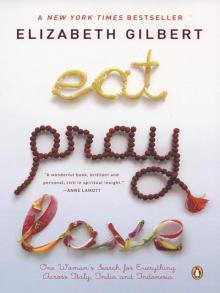 Eat, Pray, Love
Eat, Pray, Love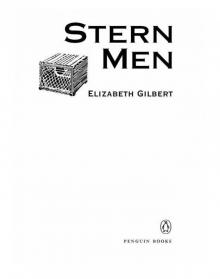 Stern Men
Stern Men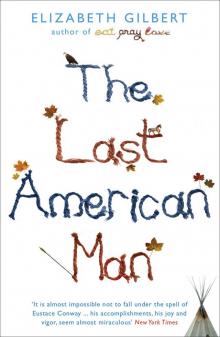 The Last American Man
The Last American Man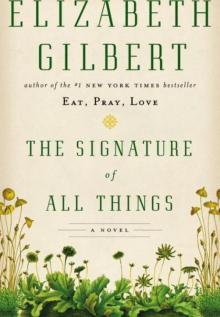 The Signature of All Things
The Signature of All Things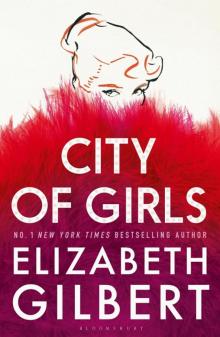 City of Girls
City of Girls Pilgrims
Pilgrims Committed: A Skeptic Makes Peace With Marriage
Committed: A Skeptic Makes Peace With Marriage Big Magic
Big Magic Committed
Committed The Best American Travel Writing 2013
The Best American Travel Writing 2013